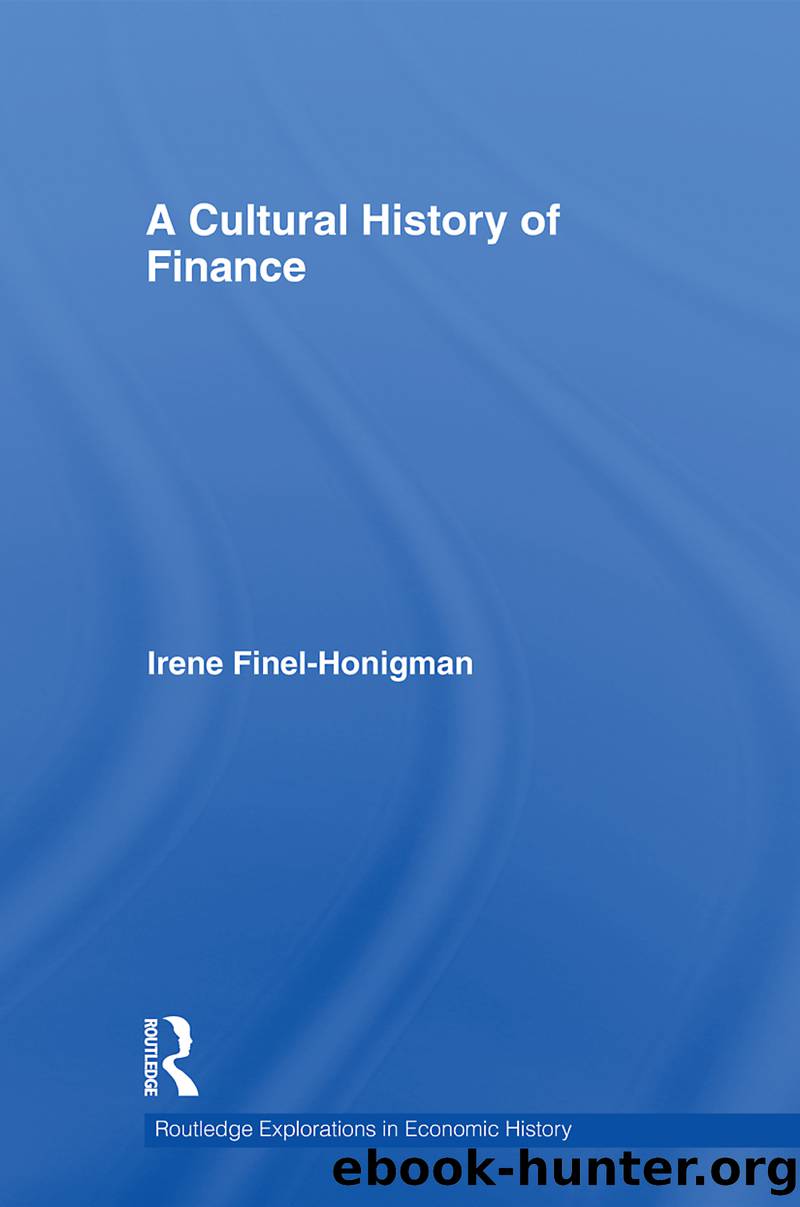A Cultural History of Finance by Finel-Honigman Irene;

Author:Finel-Honigman, Irene;
Language: eng
Format: epub
Publisher: Taylor & Francis Group
Published: 2010-08-15T00:00:00+00:00
5.5 Marxism_ the agony and the ecstasy
The inherent vice of capitalism is the unequal sharing of the blessings. The inherent blessing of socialism is the equal sharing of misery.
(Churchill, as quoted by Risk Capital Partners chairman, Luke Johnson, Financial Times , May 21, 2008)
The creation of the Soviet state and the destruction of the capitalist model proposed a system which would be the antithesis of financial history and culture. The ideal state of man would be one in which money, profit, gain, enterprise, banks, money markets, stock exchanges, and financial instruments, as means of exchange and commerce would no longer exist, thereby obliterating and rewriting economic history.
Where for centuries economics had been attacked on moral grounds, the realization of the Soviet Union gave the disillusioned, agnostic, and dispossessed World War I generation the means to condemn economics on political grounds. Capitalism was not just a moral abomination; it was now a political and moral abomination for the right and the left. By outlawing and systematically destroying the means of production and possessions of the aristocracy, the privileged, the bourgeoisie, by re-appropriating lands, real estate, and holdings of these classes, Marxism sought to eradicate the culture of consumerism, materialism, and profitability. The notorious re-education campaigns of the Russian Gulag or the Maoist purges against intellectuals, merchants, professionals and aristocracy sought to remove by force all interest, desire or aspiration to possess any object not allotted by the state to the collective body politic. In the aftermath of World War I, Marxism in the formulations of Lenin and Stalin, even in the heresies of Trotsky, offered in principle the realization of the dreams and hopes of the disenfranchised, not the apotheosis of the exploited masses, but the power of the âproletariat des bacheliers,â the educated workers, and embittered intellectuals to create a pure anti-capitalist state.
Even when these goals had been discredited and proven untenable, European intellectuals saw Marxism as the antidote to the sordid trio of state, industry, and finance, which had dominated politics and policies since the 1840s. Like Napoleon, Communist leaders Lenin, Mao, and Fidel Castro created their own mythology, revered and honored as heroes. The disdain of intellectuals toward money, its agents, and institutions in the nineteenth century became a source of revulsion at the heart of a new ideology. For the Marxist state, wealth was not only morally reprehensible, but now it was politically subversive and destructive to the nation. For Marxist and socialist writers of the 1920s and 1930s, the banker reverts to stereotype, ferociously depicted by George Grosz, Max Beckmann, and Otto Dix in the Neue Sachlichkeit School (New Objectivity School) of realistic art. Capitalism is totally cannibalistic and exploitative, with no redeeming features in the devastated economy of post-war Germany where the rich have to consume the poor, figuratively and literary, in order to survive and thrive. In French poet Louis Aragonâs Cloches de Bâle , John Steinbeckâs In Dubious Battle , Bertolt Brechtâs Die Dreigroschenoper [The Threepenny Opera] where bankers in morning coats post
Download
This site does not store any files on its server. We only index and link to content provided by other sites. Please contact the content providers to delete copyright contents if any and email us, we'll remove relevant links or contents immediately.
| Anthropology | Archaeology |
| Philosophy | Politics & Government |
| Social Sciences | Sociology |
| Women's Studies |
The Secret History by Donna Tartt(18257)
The Social Justice Warrior Handbook by Lisa De Pasquale(11967)
Thirteen Reasons Why by Jay Asher(8485)
This Is How You Lose Her by Junot Diaz(6469)
Weapons of Math Destruction by Cathy O'Neil(5867)
Zero to One by Peter Thiel(5513)
Beartown by Fredrik Backman(5376)
The Myth of the Strong Leader by Archie Brown(5252)
The Fire Next Time by James Baldwin(5037)
How Democracies Die by Steven Levitsky & Daniel Ziblatt(4975)
Promise Me, Dad by Joe Biden(4918)
Stone's Rules by Roger Stone(4877)
100 Deadly Skills by Clint Emerson(4708)
A Higher Loyalty: Truth, Lies, and Leadership by James Comey(4570)
Rise and Kill First by Ronen Bergman(4557)
Secrecy World by Jake Bernstein(4414)
The David Icke Guide to the Global Conspiracy (and how to end it) by David Icke(4408)
The Farm by Tom Rob Smith(4336)
The Doomsday Machine by Daniel Ellsberg(4257)
